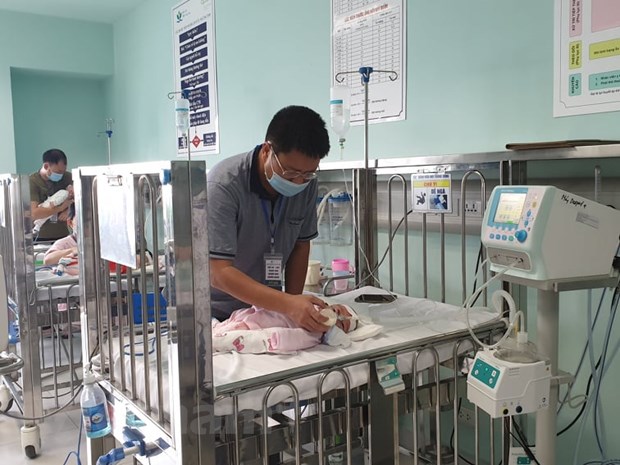 Society
Society

The National Paediatrics Hospital in the last two weeks has admitted an increasing number of babies infected with the respiratory syncytial virus, a lung and breathing passage infection affecting children under two years old.

|
| An infant infected with respiratory syncytial virus has to be on an ventilator at the National Paediatrics Hospital. — VNA/VNS Photo Thùy Giang |
HÀ NỘI — The National Paediatrics Hospital in the last two weeks has admitted an increasing number of babies infected with the respiratory syncytial virus, a lung and breathing passage infection affecting children under two years old.
Most patients being treated at the respiratory intensive care department are infants under six months old who contracted respiratory syncytial virus and have to be on ventilators while already having underlying medical conditions or born premature.
At the age of two months, baby N.N.T from Hà Nội’s Hà Đông District has to be put on ventilator due to severe pneumonia.
The patient's family members said the first symptom the baby had was a cough with phlegm. When the child showed signs of breathing difficulties and convulsions, he was hospitalised.
Doctor Lê Thanh Chương, head of the Respiratory Intensive Care Department of the National Paediatrics Hospital, said the baby was admitted to the emergency room with rapid breathing. After a physical examination, doctors found that the baby was very tired with a worsening condition.
After three days of ventilation, his condition has improved.
Another baby, four months old and born premature, was transferred from the Obstetrics and Paediatrics Hospital of the central province Nghệ An to the National Paediatrics Hospital after 12 days of respiratory syncytial virus treatment without any progress.
The child has made little improvement after several days of being on a ventilator at the National Paediatrics Hospital.
Associate Professor Lê Thị Hồng Hanh, director of the Respiratory Centre of the National Paediatrics Hospital, said there were many types of viruses that cause respiratory diseases. The first one in the list is the respiratory syncytial virus.
When the seasons change, the number of children infected with the virus increases because of changing humidity, which helps the virus spread more widely.
According to the National Paediatrics Hospital, in the last month, 40 to 50 children have been admitted to the hospital each day carrying that virus, while the number is usually around 14 on normal days.
All 150 beds at the centre have been filled. About 50 are for babies infected with respiratory syncytial virus and isolated in a separate zone to avoid infection. Doctors at the centre have to transfer cases with milder conditions to other units to admit more cases of respiratory syncytial virus which are estimated to double compared to the previous period, Hanh said.
All beds for inpatients at the Việt Nam-Cuba Hospital in Hà Nội have been also filled, with 60 per cent occupied by patients infected with respiratory diseases such as rhinitis, amidanitis, bronchitis and bronchiolitis.
According to Associate Professor Lê Thị Hồng Hanh, children under six months old, especially infants born prematurely or new-borns with underlying conditions, contract more severe cases of respiratory syncytial virus because the children's immune systems are incomplete and easily attacked by the virus.
The disease caused by the virus develops very fast. In some cases, babies are healthy but develop symptoms the next day and have to be on ventilators right after that.
The respiratory syncytial virus is found in the throat and is potentially contagious. Adults who have that virus in their throats may not be infected with the disease because of better resistance, however, if they cough, sneeze or hug babies, the virus will be easily spread to the children.
Currently, there is no specific treatment, only symptomatic treatment. Therefore, parents need to avoid taking children to public places, contacting people with symptoms of coughing, fever or runny nose, the doctor said.
She also advised parents to wash their hands before taking care of their children and especially avoid kissing children because it can potentially spread the virus.
Doctors warn that illnesses caused by the respiratory syncytial virus have common symptoms of runny nose and mild fever at the early stage. Then the patient will have a higher fever with rapid and difficult breathing.
Some children with mild conditions can do activities normally and recover by themselves after three to five days. However, the conditions will turn worse quickly with infants under six months old who were born prematurely, are underweight or were born with heart disease.
Dr Nguyễn Thị Anh Xuân, head of paediatrics unit of the Việt Nam-Cuba Hospital, said if children have a light fever but do not have breathing difficulties and still can eat and drink as normal, they should stay at home, clean their nose and throat and be given plenty of water.
When the child has a high fever, coughs more, has difficulty breathing, eats less, urinates less, and breathes quickly in the chest, then the child is showing very severe symptoms.
Families must take their child to the medical facility and should not buy medicine without prescriptions. — VNS




